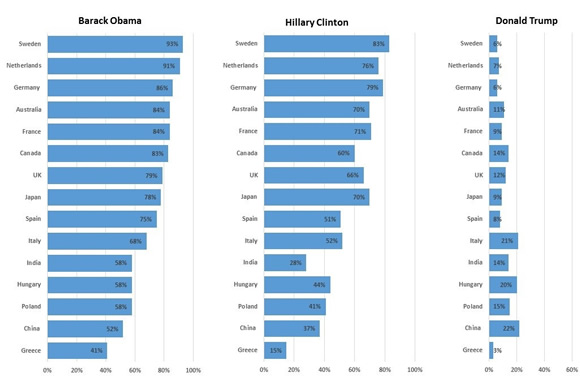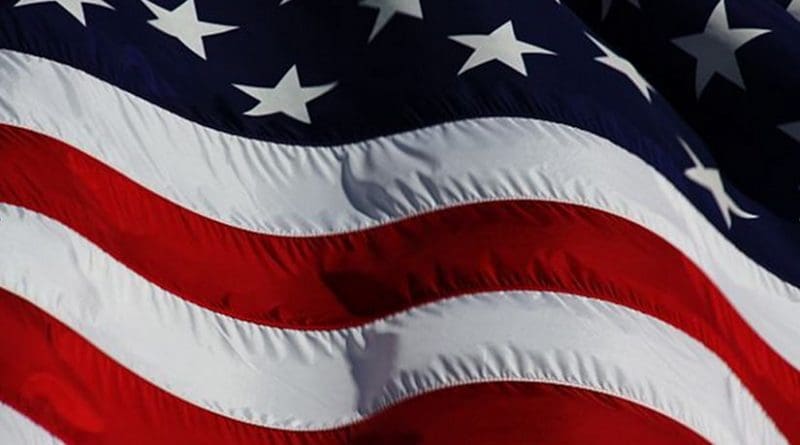World’s Mind Made Up On US Presidential Race – Analysis
Pew Research Center survey in 15 nations: Obama is tough act to follow, Clinton is more trusted than Trump.
By Bruce Stokes*
When on November 8 Americans head to the polls to elect the next president of the United States, they effectively select the de facto president of the world. And, history suggests, whoever becomes the next resident of the White House – Democrat Hillary Clinton or Republican Donald Trump – he or she will impact America’s image, and thus US influence, around the world.
Of the two principal presidential candidates, Clinton is the better known outside the United States. Having served as US secretary of state from 2009 to early 2013, Clinton enjoys the confidence of many in both Europe and Asia to do the right thing in world affairs, according to a recent survey of 15 nations by the Pew Research Center.
Majorities or pluralities in 12 of 14 European and Asian countries have faith in Clinton, including the Swedes, 83 percent; Germans, 79 percent; Australians, 70 percent; Japanese, 70 percent; and Canadians, 60 percent. On the other hand, views of Clinton among the Chinese are much more divided, with 37 percent saying they have confidence in her, 35 percent saying they do not have confidence and 28 percent with no opinion. And Clinton is still little known in India, where a majority, 56 percent, voices no opinion about her ability to act on world affairs.
Views of real estate magnate Trump are a different story. Less than a quarter of people across all 15 countries surveyed in 2016 express confidence in Donald Trump’s ability to do the right thing regarding international affairs. In fact, overwhelming majorities in most of the societies surveyed have little or no confidence in him. This includes 92 percent of Swedes, 89 percent of Germans, 88 percent of Dutch and 85 percent of both the French and British.
Most Australians at 87 percent as well as Japanese, 82 percent, and Canadians, 80 percent, also lack faith in Trump. People in Asia’s two most populated nations have little knowledge of the Republican candidate. In China, there is a split between those who have no confidence in Trump, 40 percent, and those who do not offer an opinion, 39 percent. In India, 67 percent offer no opinion.
The candidate who heads to the White House in January, whether Trump or Clinton, faces the daunting challenge of comparison with Barack Obama, who is leaving office enjoying widespread public confidence in his conduct of foreign affairs. In Europe, majorities in nine of 10 countries surveyed this year trust the outgoing president’s ability to handle international issues, including 93 percent in Sweden and 91 percent in the Netherlands. Only the Greeks regard Obama unfavorably, with 58 percent expressing little or no confidence in him.
Obama has fewer fans in Asia, but is still popular: 78 percent in Japan, 58 percent in India and 52 percent in China voice faith in Obama’s record on the world stage.
History suggests that foreign confidence in US presidential leadership can be a consequence of the triumph of hope over experience. In 2008 in Europe, in the wake of the Iraq war and other issues that put Washington at loggerheads with other countries, trust in then-President George W. Bush had fallen to 16 percent in the United Kingdom, 14 percent in Germany and 13 percent in France, according to a Pew Research Center survey. In 2009, soon after Obama had been elected, but before he had been tested by events, 93 percent of the Germans expressed confidence in the new US president, and 91 percent of the French and 86 percent of the British agreed.
Americans’ choice can influence foreign judgment of the United States, and in countries surveyed, majorities or pluralities said Obama’s election led them to have a more favorable view of the United States. Again, Western Europe and especially France, 93 percent more favorable, and Germany, 91 percent, stood out in this regard, but also 77 percent of Japanese and Brazilians, 73 percent of Indonesians and 47 percent of Chinese expressed the view that the election had buoyed their view of the United States.

The outcome of the 2004 American election had the opposite effect. A 2005 Pew Research Center survey found that after the reelection of George W. Bush in not one of 15 countries surveyed did a majority or plurality report that Bush’s reelection led them to holding a more favorable view of the United States. In Germany, France and Canada, roughly three in four respondents said the election’s outcome caused them to have a less positive opinion of Uncle Sam. This may reflect waning support for the Iraq war among those nations that had joined the US invasion and growing opposition to the US-led war on terrorism.
On the eve of the 2016 election, majorities in 13 out of 15 countries surveyed by the Pew Research Center have positive views of the United States. America receives its highest ratings from the Poles, 74 percent; Italians, 72 percent; Japanese, 72 percent; and Swedes, 69 percent. The survey shows that the US also enjoys support from Indians at 56 percent and Chinese at 50 percent.
Whether international views of the US change in the wake of the upcoming election may depend on whom voters choose and foreigners’ expectations of that incoming president.
In 2009, in 15 of 24 countries surveyed by the Pew Research Center, not including the United States, majorities or pluralities assumed that Obama would not act unilaterally and would consider the interests of countries like theirs when making foreign policy decisions. In 16 of the nations surveyed, public opinion leaned toward the view that Obama would be fair in dealing with the Israelis and the Palestinians. And in 19 nations, majorities or pluralities expected the United States under Obama to take significant measures to control global climate change.
But by 2012, in 14 of the same countries surveyed again, a median of 58 percent said Obama had acted unilaterally, 60 percent said he was not fair in dealing with the Israeli-Palestinian situation and 62 percent suggested that he had failed to take significant steps on climate change.
This reversal in sentiment is a reminder that foreigners can have unrealistic expectations of American presidents. And their disappointment when their expectations are not realized may affect views of both the presidency and the country. Between early 2009, during Obama’s honeymoon period, and 2012, international approval of Obama’s international policies fell significantly in Europe, Muslim countries, Russia, China, Japan and Mexico. In the same period, favorable views of the US declined in Germany, Britain, France, Jordan, Egypt, Lebanon and Mexico.
Without a vote in the US presidential election, foreigners look on the American electoral process with a mixture of hopefulness and anxiety. The process to date has not proved encouraging. Three-quarters of Australians and nearly seven in ten Canadians, among the foreigners who arguably may follow the US election the most closely, have a negative impression of the 2016 US presidential campaign. They know that Americans’ decision will affect their lives in ways they cannot control. They know Trump less well than Clinton and have greater confidence in her than in him. So non-Americans hope for the best, and history suggests they can be disappointed. Both their expectations and likely disappointments will affect the next US president’s ability to lead the world.
*Bruce Stokes is director of global economic attitudes at the Pew Research Center.


Trump, Brexit, European Union dissolution, the status quo will not be maintained and the current controllers are running scared and trying to do damage control to get back on top of the run away train.
“…Barack Obama, who is leaving office enjoying widespread public confidence in his conduct of foreign affairs.” Not in America, he doesn’t. The fact that Europeans don’t like Trump says more than you might think.